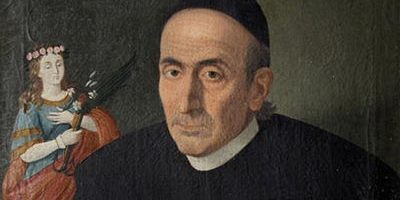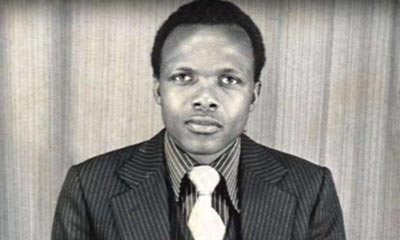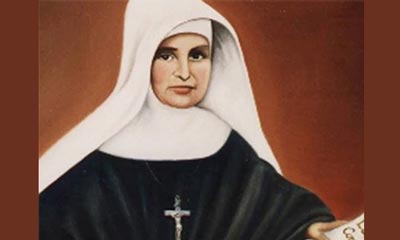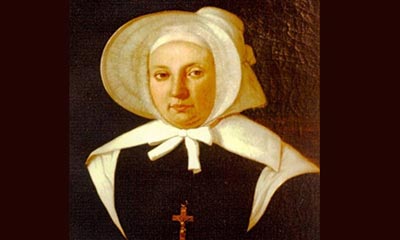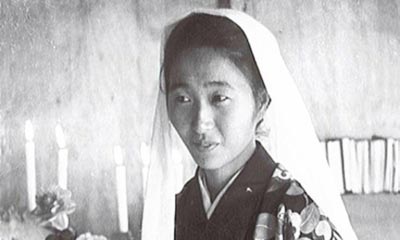June 16, 2022
Saint Joseph Pignatelli
Dear Friends,
The Society of Jesus (Jesuits) was suppressed in 1773 by Pope Clement XIV, and restored in the following century by Pius VII, in 1814. Pius XI would later credit Father Joseph Pignatelli with as much significance regarding this revival as St. Ignatius had had in the birth of the Society. This Jesuit, canonized in 1954, worked to unite and make visible the continuity, thus earning the title of “golden ring” between the old and the new Society of Jesus. His mortal remains were given the honor of being laid to rest in the vault of the Superiors General of the Society of Jesus, in the Church of the Gesù in Rome.
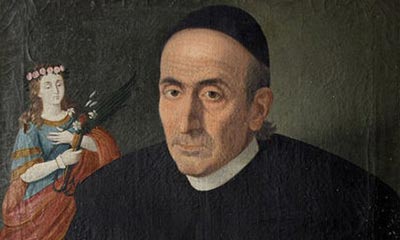 Giuseppe (Joseph) Pignatelli was born in December 1737 in Saragossa, Aragon, in northern Spain. His family belonged to the great nobility, both on the side of his father, Antonio Pignatelli, an Italian who had settled in Spain, and on the side of his Spanish mother, Francesca Moncayo-Fernández de Heredia. Joseph lost his mother at the age of four; his father died three years later. Of his many brothers and sisters, only six reached adulthood; four of them became priests. Joseph learned both Italian and Spanish from infancy. He was a modest and peaceful child who always obeyed with a smile. Together with two of his brothers, he was sent to Naples to live with his elder sister who had married there. Not long afterwards, Nicholas, the eldest brother, who had become the head of the family, decided to send them to boarding school in Zaragoza, where they attended classes with the local Jesuits. From his youth, Joseph made a habit of frequent visits to the Blessed Sacrament, and strove to control the impulses of his own feelings: for example, he took part in the games of his fellow students more to please them than to satisfy his own tastes. His sharp intelligence gave him an undeniable influence over his classmates.
Giuseppe (Joseph) Pignatelli was born in December 1737 in Saragossa, Aragon, in northern Spain. His family belonged to the great nobility, both on the side of his father, Antonio Pignatelli, an Italian who had settled in Spain, and on the side of his Spanish mother, Francesca Moncayo-Fernández de Heredia. Joseph lost his mother at the age of four; his father died three years later. Of his many brothers and sisters, only six reached adulthood; four of them became priests. Joseph learned both Italian and Spanish from infancy. He was a modest and peaceful child who always obeyed with a smile. Together with two of his brothers, he was sent to Naples to live with his elder sister who had married there. Not long afterwards, Nicholas, the eldest brother, who had become the head of the family, decided to send them to boarding school in Zaragoza, where they attended classes with the local Jesuits. From his youth, Joseph made a habit of frequent visits to the Blessed Sacrament, and strove to control the impulses of his own feelings: for example, he took part in the games of his fellow students more to please them than to satisfy his own tastes. His sharp intelligence gave him an undeniable influence over his classmates.
“Go ahead and laugh!”
Joseph’s noble birth and his family’s favor with the King of Spain predestined him for a lofty position. Very early on, however, he heard God’s call and, after several months of prayer, he decided to join the Society of Jesus. Those close to him did not fail to present him with numerous objections when told of his choice, and argued that his delicate health was incompatible with his plans. But he only expressed his joy at embracing a career in which he would be called upon to suffer for God, and perhaps even to shed his blood for the salvation of souls and the defense of the Church. Joseph entered the Jesuit novitiate in Tarragona on May 8, 1753; he was fifteen years old. During this first stage of his formation, he was sent to serve the sick in hospital for a month, as was the custom. On the first evening, he was late returning from the hospital because he had stopped too long at the bedside of a patient covered in wounds. One day he found himself in the midst of a group of young noblemen visiting the house, who scoffed at him when they saw who he was. “Go ahead and laugh!”, he told them, “But when you are done, you will all owe me a coin for my poor. It is not fair that I should entertain you for free!” He also taught the catechism to the inmates of the nearby prison. Among the various trials organized by the novitiate, Joseph and two fellow students went on a month-long pilgrimage to Our Lady of Montserrat, during which they had to beg for their bread. As the group’s appointed leader, he sacrificed himself so that the others might have the best of everything.
In May 1755, having made his temporary vows, he was sent to the college of Manresa to complete his basic training (1755-1757). His achievements were remarkable. He was not only able to read the classical authors in the original Greek, but also to express himself in that language. Moreover, he gave classes at the Juvenate, and learned Catalan in order to do a bit of street ministry. He was always ready to help and readily replaced his brothers when they were unavailable. His philosophy studies took place in Calatayud from 1757 to 1759. There, both the rector and the professor of philosophy were highly prejudiced against him, and criticized his every move; they considered him to be a mediocre religious and student. As for Joseph, he turned to the Blessed Virgin and humbly asked for the grace to be better. This ordeal lasted three years. Far from becoming discouraged, Joseph cultivated humility and self-denial. At the end of the course, it was he who was chosen to stand the public test: he then revealed himself to all as a brilliant scholar. He spent the next four years in Zaragoza to study theology. His amazing memory also allowed him to learn many ancient and modern languages: Hebrew, Chaldean and Syriac as well as French, English and German.
A fruitful correspondence
The regular correspondence he kept up with priests of the Society of Jesus who had left for faraway missions led Joseph to offer the Superior General, Father Ricci, to go and join them himself. But his wish was not granted. Meanwhile, the pace of his work was exhausting and he contracted tuberculosis. His superiors forced him to rest. Despite the care of competent doctors, he never fully recovered. However, he was ordained a priest at the end of Advent in 1762. His superiors wanted him to take a complete rest, but he could not bear the feeling of being useless. At his insistence, he was entrusted with one of the lower classes at the college in Zaragoza, and later with teaching the humanities. His general attitude, a mixture of seriousness, dignity and human warmth, led the children to understand that they were loved, and that his dedication was focused on their own good. Within a few weeks he had won them over; a sign from him, for example, was enough to stop any excess of childish exuberance. He willingly sought the advice of his elders, and also followed it in order to implement the educational methods of the Society. He had a unique talent for using the humanities curriculum, centered on classical authors, to draw moral and religious lessons from a paragraph, a fact, an attitude, or even an incident in class. His teaching often taught his pupils standards they would refer to for the rest of their lives.
When his health had sufficiently recovered, the young priest sought a saintly distraction from his educational work in pastoral service. He catechized street children and visited the sick and the imprisoned, always showing an attention and a charity that reflected the love of Christ for souls. In the confessional, his goodness and his sound doctrine attracted a crowd of penitents. He was also entrusted with preparing condemned prisoners for their execution, a very sensitive ministry. By dint of gentleness, he won over the hearts of these unfortunate souls to Christ; sometimes he obtained a pardon for them. In 1766, a serious famine swept through the country. Discontent spread, especially in the city of Zaragoza, where peasants from the surrounding area had flocked; a riot was about to break out. Some ill-intentioned people wanted to blame the Jesuits, but on the day of the insurrection, Father Pignatelli went out to meet the crowds and succeeded in appeasing them.
A tremendous storm was brewing against the Society of Jesus, however. All the forces of the “Age of Enlightenment” (the 18th century) were united against it: the rationalist philosophers, the Jansenists, the Gallicans and the Regalians (supporters of the supremacy of the royal power) as well as the secret societies were determined to have it suppressed by the ruling princes. They very cleverly placed ministers chosen for this purpose at the side of the puny kings of Spain, Portugal and France. Pope Clement XIII stood firm in the face of the pestering of their governments, but they soon decreed the banning of the Society in their respective countries: Portugal expelled the Jesuits in 1759, followed in 1764 by France. In 1767, the edict of expulsion from Spain and its possessions was issued, with the only official explanation being that the monarch kept his grave reasons “in his royal heart” (he had been made to believe that the Jesuits thought he was an illegitimate child). Orders went out to all provincial governors. Six hundred Jesuits from Spain and the New World were expelled. A modest allowance was granted to them, on the condition that no protests would be made on their part against the royal act.
Remaining with his Brothers
Father Pignatelli was living in Zaragoza at the time. The rector of the house, trusting in the protection of the king, at first refused to believe the news. One morning, however, armed troops arrived and the members of the community were summoned to the refectory. Because of his noble status, Father Joseph could have made use of his family connections in order to avoid the pains of exile, and remain in Spain: instead, he chose to remain with his Jesuit brothers. They were packed into the carts that were usually used to transport criminals. Their pupils massed at the city’s exit, expressing their gratitude to their teachers. The soldiers tried to contain the indignant crowd; it was the Fathers who intervened to calm them down. The journey to Tarragona was so grueling that Father Pignatelli coughed up a lot of blood. Members of his family, who lived there, begged him to leave the convoy, but he refused, for the consolation of his brothers. At the port of Salou, the religious were loaded onto thirteen ships. Father Joseph obtained permission from the captain of the convoy to move from one ship to another so that he could encourage his fellow Jesuits.
The city of Genoa agreed to admit them to Corsica, an island which was under its dependence at the time. The Jesuits were disembarked in Ajaccio, and then transferred to Bonifacio, at the southern tip of the island, where they stayed for a year. Father Joseph found suitable accommodation for them all, but they were very poor. However, they received help, especially from Italy. Father Ricci sent them sacred vessels and liturgical vestments from Rome. They were prohibited from any kind of apostolate, but the fervor and piety of the exiles impressed the local population. Father Joseph organized courses with the many teachers present, and even theological jousts. In 1768, Corsica was ceded by Genoa to France, and a large French garrison disembarked at Bonifacio. A few weeks later, all the religious left the island for Genoa and then for Ferrara, in the States of the Church, a city whose papal legate, Mgr Pignatelli, was a close relative of Father Joseph. They were joined by the exiles from Mexico. Father Joseph organized his confreres according to their houses of origin, under their respective superiors. The young men soon began studying again. Once again, his family urged him to leave the Society of Jesus before it was suppressed, and to return to Spain where he had the promise of great advantages. But, far from giving in, he obtained permission from his superiors to pronounce his final vows (1771).
Pestering the Pope
In 1773, giving in to the pestering of the royal courts of Europe, Pope Clement XIV suppressed the Society of Jesus, without judgement or condemnation, with the brief Dominus ac Redemptor. It was later said that in signing this document the Pope proclaimed: “This suppression will lead me to the grave”; in fact, he died the following year. Pius VI, his successor, felt he could not re-establish an institute that his immediate predecessor had suppressed. At the height of this ordeal, Father Ricci consecrated his Order to the Sacred Heart. He urged his brothers to pray, to be patient and to forgive, and then died two years after the dissolution. In addition to this grief, Father Joseph had the pain of seeing his brother, Nicholas, who had also become a Jesuit, return to a secular and princely life. In 1779, Joseph became the spiritual director of his niece, who was married to the Duke of Villahermosa. His great culture enabled him to organize literary meetings for the noble families of Bologna; many of them returned to the faith. But his most important mission was to prepare the restoration of the Society of Jesus.
His first concern was to strengthen the religious spirit among his dispersed Jesuit brothers. He showed himself to be full of the “creative courage” of which Pope Francis spoke with regard to Saint Joseph, the spouse of Mary: “In the face of difficulty, we can either give up and walk away, or somehow engage with it. At times, difficulties bring out resources we did not even think we had. As we read the infancy narratives, we may often wonder why God did not act in a more direct and clear way. Yet God acts through events and people. Joseph was the man chosen by God to guide the beginnings of the history of redemption. He was the true “miracle” by which God saves the child and his mother. God acted by trusting in Joseph’s creative courage. Arriving in Bethlehem and finding no lodging where Mary could give birth, Joseph took a stable and, as best he could, turned it into a welcoming home for the Son of God come into the world (cf. Lk 2:6-7). Faced with imminent danger from Herod, who wanted to kill the child, Joseph was warned once again in a dream to protect the child, and rose in the middle of the night to prepare the flight into Egypt (cf. Mt 2:13-14). A superficial reading of these stories can often give the impression that the world is at the mercy of the strong and mighty, but the “good news” of the Gospel consists in showing that, for all the arrogance and violence of worldly powers, God always finds a way to carry out his saving plan. So too, our lives may at times seem to be at the mercy of the powerful, but the Gospel shows us what counts. God always finds a way to save us, provided we show the same creative courage as the carpenter of Nazareth, who was able to turn a problem into a possibility by trusting always in divine Providence.” (Letter Patris Corde, December 8, 2020).
Paradoxical attitudes
Ironically, two non-Catholic monarchs refused to implement Pope Clement XIV’s brief in their states: the Protestant Frederick II of Prussia for the territory of Catholic Silesia that had recently been annexed to his kingdom, and the Orthodox Empress Catherine of Russia for the similarly situated territory of White Russia (Byelorussia). Catherine of Russia even obtained from the Pope, a few months before his death, a new writ allowing the status quo to be maintained for the Jesuits in Russia. Pius VI confirmed this authorization, and Joseph Pignatelli, before whom the Pope had formally recognized the legitimacy of the Jesuits in Russia, contacted the White Russian Province, which he planned to join. But ill health prevented him from carrying out his plans.
Many former Jesuits had gathered in the Duchy of Parma because of the good reception they had received from Duke Ferdinand I. They had become secular priests and were engaged in various ministries, to the great benefit of many souls. The Duke came to regret the disappearance of their Order. Also noting the disorganization of children’s education after the Jesuit colleges had been closed, he appealed to their dedication and put them in charge of education in his duchy. Subsequently, in an effort to secure this work over time, he set about restoring the Society. To this end, in 1793, through the intermediary of Empress Catherine, he addressed the superior of the Jesuits in Russia, asking him to recognize the “ex-Jesuits” of his duchy as his sons. The superior sent him a number of Fathers. In 1797, Father Joseph privately renewed his religious profession in the hands of one of them. Two years later, a novitiate was founded in Colorno, in the province of Parma, and Father Pignatelli was given the office of Master of Novices. Under his direction, the novices were formed to the virtues and the interior life by closely following the directories and the spirit of the Society. Former Fathers came to join them. Father Joseph immersed them in the spirit of the Spiritual Exercises with great gentleness, endeavoring first of all to restore the spirit of the Society in their hearts.
The soul of Jesuit spirituality and the principle of its unity lies in the book of the Spiritual Exercises, in which Saint Ignatius summarized his own journey of conversion from the pursuit of worldly glory to the total service of God. From the meditation on the Foundation comes the emphasis on the last thing: eternal salvation, the fulfilment or acceptance of God’s will, and indifference to everything that is not this ultimate goal. Meditations on the Reign of Christ and the Standards give rise to a passionate love for the Word made flesh, the will to distinguish oneself in His service by being poor and humbled like Himself.
Father Joseph led the way towards this ideal by making personal contributions in all areas: the touching memories left by his novices show him taking a broom to do the housework, or carrying a knapsack to beg from door to door. In fact, he took care to provide for the institute’s temporal needs, since it was very short of resources at the time. He also founded a hospital in Colorno where novices and teachers could, following his example, devote themselves to the sick. His trust in God sustained him in his trials. He gave help to a great many poor people, never stopping to count the cost, to the point that money seemed to multiply in his hands. “Some people”, he once told a Father, “would like to see me reduce the help I give to the poor, and urge me to save money for our own needs… However, I see that God gives me as much as I give to others.” By contrast, his brother Nicholas’s wasteful lavishness was an especially painful cross for him to bear.
A patient worker towards restoration
Pope Pius VI, who had been exiled to Valence (France), died in 1799. His successor Pius VII officially sealed the recognition of the Society of Jesus in Russia (about two hundred members) with the brief Catholicæ fidei of March 7, 1801. His act triggered a wave of requests for affiliation to the Russian Jesuits from groups of former Jesuits in Europe and the United States. Father Joseph, however, was aiming for the recognition and canonical restoration of the Society as such. In 1803, he was appointed Provincial for Italy by the Superior General of Russia. Renouncing his desire to go to Russia to serve the poor inhabitants of the countryside, he accepted this position out of obedience. Having travelled to Naples, he used great prudence in order to obtain the agreement of King Ferdinand IV, who had been so deeply struck by the events of the French Revolution that he asked the Pope to authorize the return of the Jesuits to Naples. On July 30, 1804, the Society of Jesus was restored in the Kingdom of Naples and Sicily. The Holy Father, however, advised great prudence: there was to be no distinctive habit, no public proclamation… These measures had in effect been taken in a particularly difficult political context due to Napoleon’s campaigns in Italy, which forced the Jesuit Fathers to change residence many times, moving to Parma, Naples, Rome… In 1807, Father Pignatelli also obtained the restoration of the Society in Sardinia.
Father Pignatelli had suffered from chronic tuberculosis since his youth. His many duties hardly allowed him to spare himself. In the early days of October 1811, he once again coughed up blood, which incident was followed by severe fatigue. On November 2, thanks to a short respite from his illness, he was able to celebrate a final Mass and to visit the poor. On his return, he had no choice but to take to his bed; he would never rise again. He died in Rome on November 11, having foretold to his brothers the coming restoration of the Society of Jesus. On August 7, 1814, Pope Pius VII, having meditated at length on the causes of the disasters of the Church and society during his imprisonment by Napoleon, officially re-established the Society soon after his release. He went to the Church of the Gesù, where a hundred former Jesuits, bent with age and work, were waiting for him, and ordered the Bull of Restoration Sollicitudo omnium Ecclesiarum (The Care of all Churches) to be read out.
Let us ask Saint Joseph Pignatelli for perseverance in the service of the Lord, in the very midst of the many struggles that the contemporary world presents to the faithful of Christ and of His Church.


